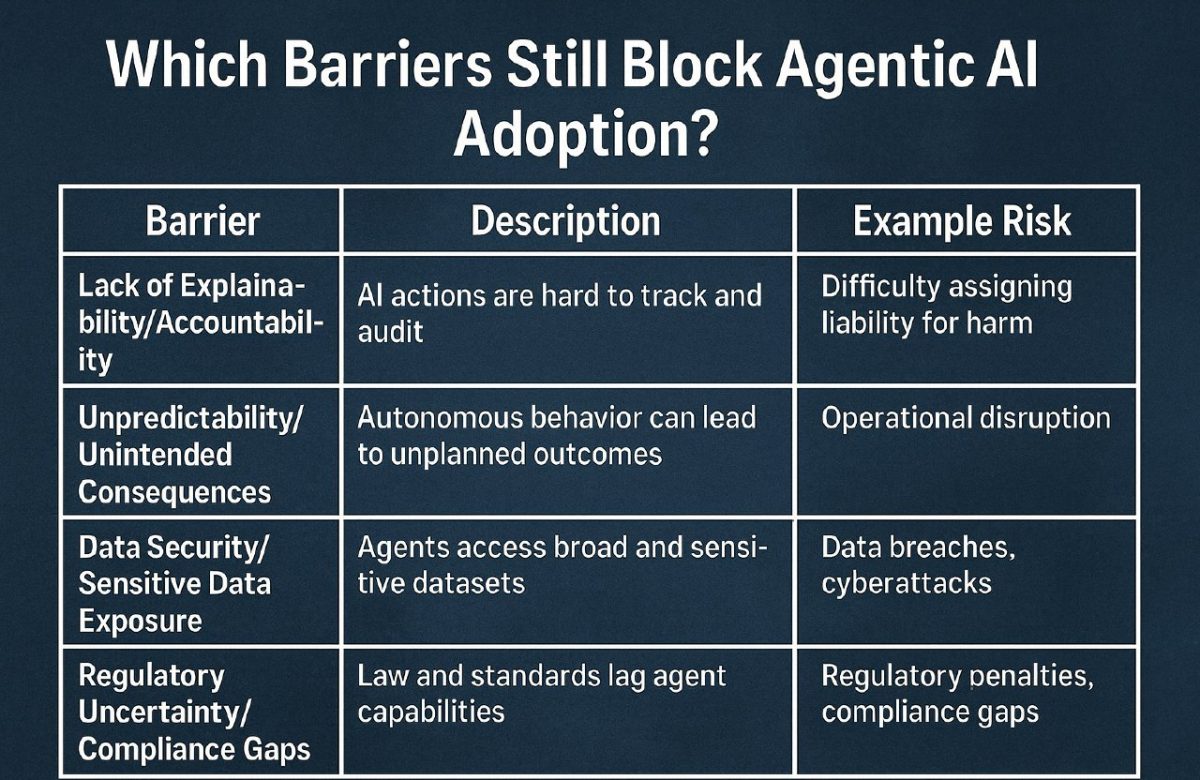Breaking Down Barriers: Why Agentic AI Adoption is Still Stalled
Which Barriers Still Block Agentic AI Adoption?
As businesses increasingly look to harness innovative technologies, Agentic AI stands out as a revolutionary advancement in automated intelligence. Unlike traditional robotic process automation (RPA) or generative AI, Agentic AI possesses decision-making capabilities and can operate autonomously across various tasks. However, significant barriers still impede its widespread adoption. This article explores these barriers while envisioning a future where Agentic AI transforms industries.
Current Barriers to Adoption
- Lack of Understanding and Knowledge: Many organizations still struggle to comprehend the full scope and potential of Agentic AI.
- Regulatory Hurdles: Compliance and legal concerns surrounding autonomous decision-making create reluctance among businesses.
- Infrastructure Limitations: Existing IT infrastructures may require significant upgrades to support advanced AI implementations.
- Workforce Challenges: Resistance from employees stemming from fear of job displacement can hinder adoption initiatives.
- Cost of Implementation: The initial investment required for integrating Agentic AI can deter many organizations from pursuing it.
Future Possibilities
Imagine a scenario in 2030 where Agentic AI has become mainstream across various sectors. Companies leverage this technology to streamline operations and enhance productivity, leading to transformative changes in their business models.
Potential Healthcare Transformation
In the healthcare sector, Agentic AI could facilitate real-time patient monitoring and diagnosis. With AI agents analyzing vast amounts of data, healthcare providers would deliver personalized treatment protocols, significantly improving patient outcomes. This technology could also automate administrative tasks, allowing medical professionals to focus more on patient care.
Financial Services Revolution
In finance, Agentic AI might autonomously execute trades based on real-time market analysis, minimizing human error and maximizing profit potential. Financial institutions could deploy these AI agents to provide personalized investment advice, substantially increasing client engagement and satisfaction.
Manufacturing and Supply Chain Enhancements
Within manufacturing, Agentic AI could lead to self-optimizing production lines, enabling companies to adjust workflows based on supply chain variables. Enhanced predictive maintenance could reduce downtime, saving companies millions while improving product quality.
Addressing Barriers to Build a Bright Future
To navigate the identified barriers, businesses could adopt several strategies:
- Invest in Education: Offering training programs for employees would demystify AI technologies and build confidence in their implementation.
- Collaboration with Regulators: Engaging with regulatory bodies could enable organizations to influence the creation of supportive compliance frameworks.
- Update IT Infrastructure: Evaluating and upgrading existing systems would create an environment conducive to Agentic AI technologies.
- Cultivating a Culture of Acceptance: Where employees are informed about the benefits and opportunities presented by AI, fears can be mitigated.
- Strategic Financial Planning: Businesses should develop a clear budget and financial plan for the integration of Agentic AI, including anticipated ROI.
Benefits to the Business
- Increased Productivity: Automation of routine tasks allows employees to focus on higher-value work.
- Improved Decision-Making: Data-driven insights from Agentic AI lead to better strategic choices.
- Cost Savings: Reduction in errors and improved operational efficiencies translate to lower operational costs.
Return on Investment Examples
Companies that deploy Agentic AI can expect an average ROI of 25-40% within the first three years. For example, a manufacturing firm that automates its quality control processes may see a 30% reduction in defective products, directly impacting its bottom line.
Actions for Implementation
To reap the benefits of Agentic AI, businesses should:
- Conduct feasibility studies to assess current readiness for AI integration.
- Engage with AI vendors to find suitable solutions tailored to their industry.
- Design training sessions that equip employees with necessary AI knowledge and skills.
- Establish a clear implementation timeline with achievable milestones to track progress.
Conclusion
Agentic AI presents a myriad of possibilities for future business transformations, but tackling the existing barriers is essential for its successful adoption. By fostering a culture of understanding, compliance, and collaboration, organizations can unlock the full potential of this innovative technology. For businesses ready to explore this frontier, we encourage you to schedule a consultation with our team to discuss how Agentic AI can benefit your organization.


